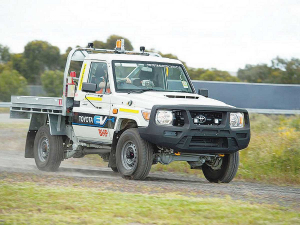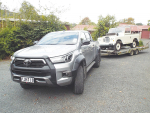Over the ditch in Australia, Toyota utes and trucks are the workhorses of the country’s economy.
With an eye to reducing emissions, as we move into the future, Toyota Australia has converted a venerable Landcruiser 70 Series single-cab ute to an electric drive line. This will be trialled at a BHP Nickel West mine site in Western Australia.
The conversion, carried out by Toyota Australia’s product planning and development division in Port Melbourne, sees the LC 70 equipped for underground use, where it will operate under full battery power.
Toyota Australia’s president and chief executive Matthew Callachor says the trial is another step in the Japanese manufacturer’s move towards a zero carbon emissions future.
“BHP and Toyota have demonstrated a strong relationship throughout the last 20 years and this project is a testament to how we can work together in our respective industries to change the future,” Callachor said.
Edgar Basto, president, of Minerals Australia, BHP, says the partnership is another step in the mining giant’s ongoing studies into how the company can reduce the emissions intensity of its light-vehicle fleet.
“Reducing our reliance on diesel at our operations will help achieve our medium-term target of reducing operational emissions by 30% by 2030,” he said.
Meanwhile, looking at the broader Australian picture, Toyota has almost doubled its sales of hybrid vehicles in Australia during 2020. This saw a record of 54,335 hybrids sold, representing 26.5% of Toyota’s total sales. This was double 2019’s sales of 27,846 units.
The RAV hybrid was the star for Toyota and Australia’s best-selling hybrid for 2020.
On the commercial front, the Toyota Hilux (45,176 sales) was the country’s most popular commercial vehicle for the 23rd year straight and Australia’s best-selling vehicle for the fifth year in a row.











